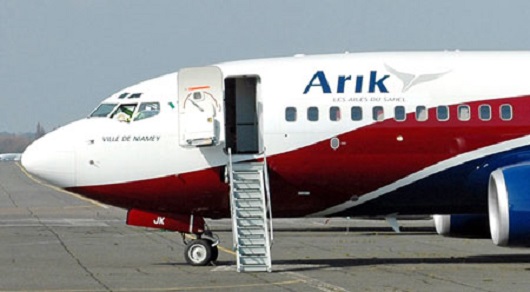
Lagos, Nigeria | AFP |
Thousands of passengers across Africa have been left stranded after Nigeria’s largest airline said Tuesday it had suspended operations and might remain grounded for several days.
Arik Air attributed the “temporary disruption” to “pending approval of aircraft documentation related to insurance renewal… a challenge due to the long weekend holidays” for the Muslim feast of Eid al-Adha.
Two other Nigerian carriers, Aero and First Nation, also suspended flights this month.
A dire shortage of dollars, linked to the drop in the price of oil, which accounts for 70 percent of Nigeria’s economy, has drastically reduced banks’ liquidity and left the country’s airlines unable to pay their bills.
Frequent sabotage by armed groups in the Delta region — of which there was another incident Tuesday — has also affected oil revenue.
Earlier this year Angola became Africa’s largest oil producer, overtaking longtime leader Nigeria, which slipped into recession at the end of August.
“The airline business is very capital intensive. No airline operator can do this business without having to go borrowing,” Allen Onyema, head of another airline, Air Peace, wrote in a newspaper column published Tuesday.
“We need to have banks on our side. But I must say that a lot of them are scared of lending money,” he added.
International carriers have also been affected, with Emirates running a single daily flight from Nigeria to Dubai instead of the usual two, and Air France-KLM reducing passenger capacity by using smaller aircraft.
Earlier Tuesday, the Niger Delta Greenland Justice Mandate, a newly-formed rebel group, said it had “brought down” a pipeline overnight.
In a statement sent to journalists the group, established just over a month ago, said the attack in the Delta State was “a mark of our faith to totally grounding the Nigerian oil economy.”
The pipeline leads to a major pumping station operated by the Nigerian Petroleum Development Company.
A prominent member of the local Afiesere community, Emmanuel Shekaleke, confirmed the incident, saying the attackers “used a hacksaw on different spots on the line.”
On August 30, the same group attacked another pipeline and accused the military of “endlessly harassing” people in the south of Nigeria.
The previous week, the Nigerian military launched “Operation Crocodile Smile” in the oil-hub of Warri claiming to have killed five militants and arrested 23 others in a weekend raid.
 The Independent Uganda: You get the Truth we Pay the Price
The Independent Uganda: You get the Truth we Pay the Price



